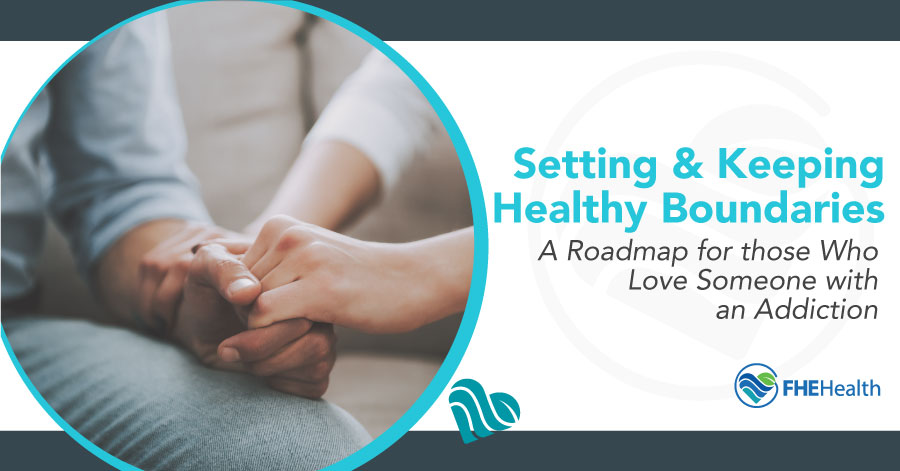
There’s nothing you want more than for your loved one’s addiction to just go away. You want to shield them from the consequences of their actions, provide them with the tools to get healthy, and then move on with your lives. Although that’s not easy to do, setting healthy boundaries is a critical step for your loved one’s success.
When you enable a person who has a drug addiction, you are preventing them from experiencing the negative consequences of their actions. They don’t learn. They never grow.
Setting boundaries within relationships is the cornerstone of helping your loved one to realize what those consequences are and that it’s their responsibility to overcome the situation.
Understand the Conditions of the Addict
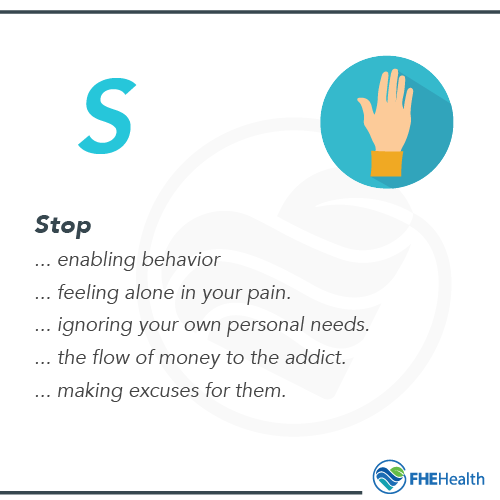
What is your loved one facing right now? Perhaps they use alcohol and drugs from time to time. You feel as though they are okay as long as you can be there to support them. Be realistic with yourself about what’s really happening.
- Addiction is a disease just like cancer or diabetes. If they don’t recognize it as such, get treatment for it and work to fix it, they could die.
- You can’t control addiction or your loved one’s actions, no matter how much you try. Because it’s a physical change in the brain, dependency requires formal treatment.
- Their disease makes it impossible for them to maintain their relationship with you. You can’t use love, guilt or other emotions to make them stop. It’s not about disappointing you.
- Their use of drugs and alcohol negatively impacts their body and mind. It’s not just a drink here and there. It’s a big part of their daily life.
- Enabling them, by helping them to deal with the consequences of their use, isn’t beneficial to them. Instead, you must fight for your relationship and their survival.
Understand where your loved one is in their addiction right now. Create a clear picture. Then, seek treatment.
Understanding Your Role in Their Addiction
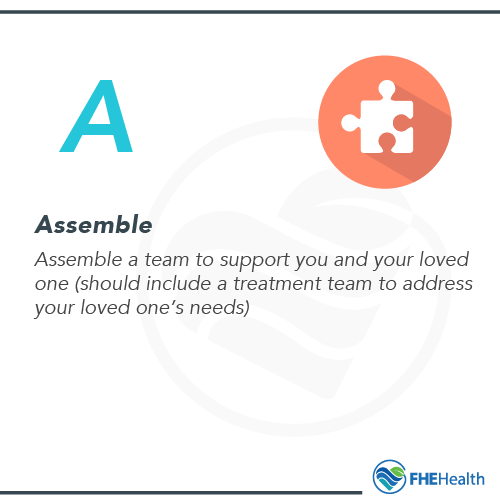
Most parents, spouses and others who have a loved one with an addiction enable. They do this because they want to help. Families have to learn how to manage an addict during and after they return from treating.
Your first step is to admit that you have been enabling your loved one. You must recognize and be willing to break that enabling habit.
Fear, guilt and other strong emotions play a role in why you do this. It’s not something to feel bad about having done, but it’s essential to recognize the need to change this behavior now.
What Is SANITY?
It’s necessary to prevent family from overstepping boundaries, even when their intentions are good. Setting boundaries with toxic family is important, and it’s essential to set your own guidelines too. Consider this acronym and how it can apply in your situation. SANITY is:
S:
- Stop enabling behavior
- … feeling alone in your pain.
- … ignoring your own personal needs.
- … the flow of money to the addict.
- … making excuses for them.
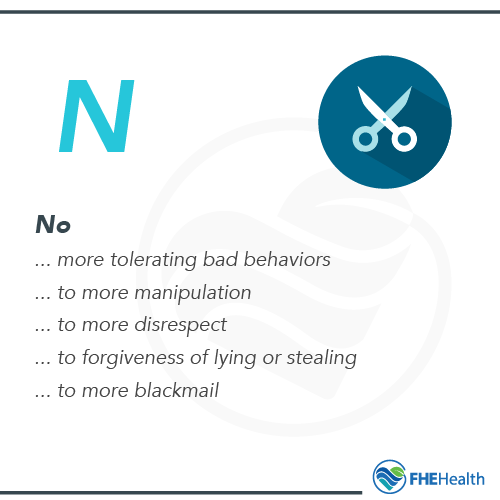
A:
- Assemble a team to support you and your loved one (should include a treatment team to address your loved one’s needs)
N:
- No – Stop tolerating bad behaviors
- … to more manipulation
- … to more disrespect
- … to forgiveness of lying or stealing
- … to more blackmail
I:
- Implement a set of boundaries and rules and stick to them.
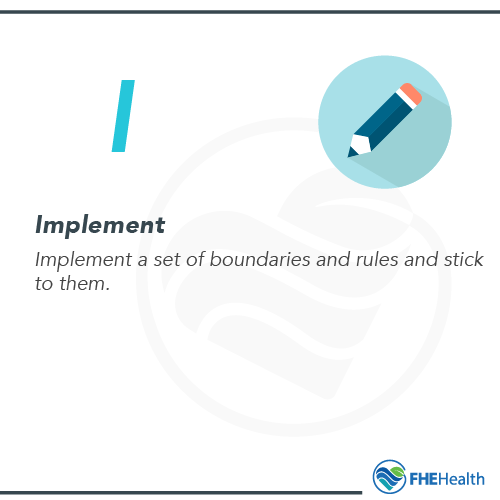
T:
- Trust in your instincts…
- … and in a Higher Power
- … and in the professionals who are helping you
Y:
- Yes to the good recovery opportunities
- … to the signs of humility
- … to the signs of recovery
How to Set and Keep Healthy Boundaries with an Adult Child
Setting boundaries with their adult children is by far the most difficult thing for many people. Remember that as a parent, you are responsible for modeling the behavior you want your children to display, even as adults. If you don’t respect boundaries, neither will they.
What does having a clear boundary for adult children mean? Here are a few components of it:
- First, recognize that you can’t be responsible for the consequences of your child’s behavior nor their choices. Separate yourself from their problems. Parents should work together.
- Create a defined action plan to confront adult children.
- Establish clear consequences. Then, stick to them.
- Encourage your child to figure it out on their own.
- Establish yourself as a person outside of being a parent — who you are as an individual.
There are times when parents should step in to help their adult children, but it should never be to help them solve their problems or to bail them out. Instead, you can support your child into recovery.
How to Set Boundaries with a Spouse

What happens if that individual is your spouse? The rules can sometimes be harder to manage. They follow the same basic goals, though.
- Recognize you can’t make them stop no matter what you say or do.
- Instead, focus on what you can do, including establishing accountability.
- Don’t threaten to leave if they don’t stop. You can’t manipulate them into changing.
- Determine your bottom line. Then, make sure they know and create options for yourself if they relapse. For example, have an exit plan if you’re going to leave.
- Work on your own recovery from enabling behaviors. Focus on what you can change, not what you can’t.
Tips for Holding the Line
Consider these tips to help you on the path. Make simple, clear statements to ensure they understand what you are facing.
I Will No Longer Give You Money
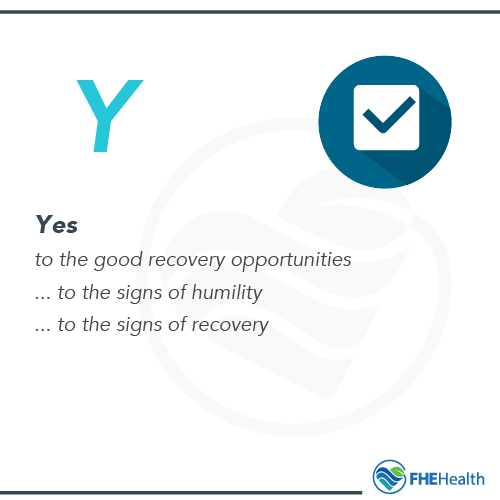
Make it clear that you’re no longer going to financially support your loved one’s use. Ensure they understand this isn’t an option.
You Can’t Call Me Anymore Unless You’re Telling Me You’re Going to Treatment
In this situation, be firm. You don’t want to hear about anything else, even if they push.
The Next Time You Drive Intoxicated, I’m Calling the Police
Be specific and hold to your threat. If you see your loved one engaging in reckless behavior, report it.
You Can’t Work for Me Until You’re Sober
This can apply to employers but also to daily life. You can’t welcome a family member, friend or anyone else into your home until they’re sober. It can also apply to the custody of children.
I Can’t Hang Out with You Until You’re Sober
Put simply, you can no longer spend time with them for any reason. You won’t give them rides, listen to them or spend time with them like you use to.
FHE Health Offers the Programs and Treatment They Need
You can’t fight this battle on your own. Reach out to FHE Health’s counselors for immediate help by calling (833) 596-3502.






